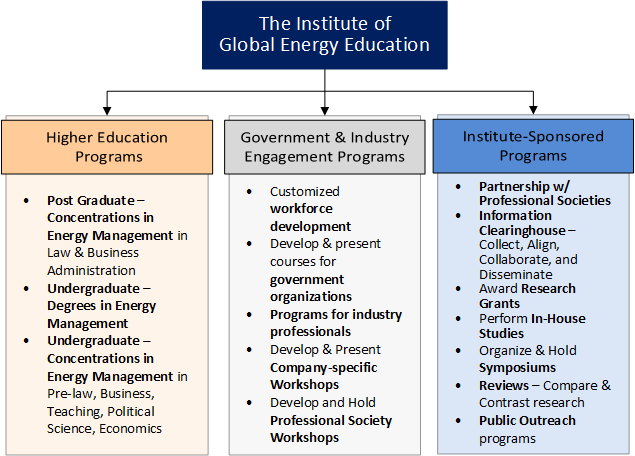The Institute intends to achieve its Mission by establishing three educational channels as shown below: Higher Education Programs, Government & Industry Engagement Programs, and Institute-Sponsored Programs.

We will focus on all aspects of the energy model from a sound engineering, sustainability and practical perspective, ensuring alignment with the work of others in the industry, providing a clearing house of technical and educational energy information for professional generalists working in the energy business. To achieve this objective, we will support research through Grants, and may perform in-house research (or reviews, comparisons & contrasts of existing research) with in-house staff.
The Institute believes that these educational channels will leverage the effectiveness of energy education by impacting potential future elected leaders, regulators, business leaders, and educators. Additionally, we believe these channels will leverage energy education for generalists going into the Energy Industry.
We intend to become the premiere resource and trusted partner for intellectually impartial, technology agnostic, unbiased energy education programs designed for non‑technical degree fields and occupations. At selected institutions of higher education, we intend to collaborate with the law (or pre-law), business (or Master of Business Administration), Teaching, Political Science, and Economic degrees to implement concentrations of Energy Management or Energy Administration, so that graduates with these concentrations understand how energy works. Our educational programs consider the holistic impact of how we create, convert, transport and utilize energy from cradle to grave. As the go-to energy collaboration network, we will set the standard for accurate and unbiased assessments of the most current and cutting-edge energy technology information and processes.
The Institute will be closely aligned with the Department of Energy and other key energy organizations as well as institutes of higher education to ensure collaboration and relevance to the professional community. Again, we seek not to reinvent but to build on existing proven foundational programs and know where they exist. As such, the Institute will provide various energy education course program certificates as well as partner with higher educational institutes to develop Energy Administration degree programs at those institutions.
For example, Attorneys or MBA graduates planning to go to work in the energy field, could attend workshops at an Institute-sponsored Center for Excellence in Energy Education at a partner University, at the Institute, or online; or they might graduate with a dual Law degree and a Masters in Energy Management. Areas of programs focus could include but not be limited to:
- Sustainability of Energy Markets and the Impact of Climate Change
- Energy Conversion and Power Generation
- Cost Components of Power Generation Facilities
- Power Production Technologies – Thermal: Gas, Coal, Oil, Nuclear, CHP
- Power Production Technologies – Renewable: Solar, Wind, Storage, Hydro, Biomass
- The Role of Fuel Suppliers
- The Flow of Energy from a Generating Site to the Electric Grid and to the Consumer
- Management of the Electric Grid and how Generating Units are Dispatched – Technically
- Management of the Electric Grid and how Generating Units are Dispatched – Commercially
- The Roles of FERC, NERC, ISOs, Balancing Authorities, Load Serving Entities
- Regulated and Unregulated Energy Production Environments
- Energy Economics and Asset Management, including Decommissioning & Site Restoration
- The Impact of Distributed Generation & Feed-in-Tariffs
- The Impact and Potential of Distributed Generation Resources & Smartgrids
- The Impact and Potential of Microgrids
- Why Renewable Is Not Necessarily Carbon Free – The Need for Carbon Free Flexible Generation
- The Needs for Energy Storage
Our programs will enable students to investigate, conduct scholarly research (via Grants or by using the Institute’s Clearinghouse references) and gain potential employment in an Energy related field. Students will be enabled to understand, communicate, and apply best Energy Management practices in their general field of employment. Programs will seek to increase the diversity of professionals in the energy business. The Institute will target a prominent school as the first higher education institute to collaborate with to develop the first Energy Management Degree Program. In addition to political and business leaders, the programs will provide a clearing house of key technical and educational energy information for professional degreed generalists required to work in the energy business. Such generalists may lack the practical knowledge of how the energy business works to successfully apply and integrate their general field of study to be most successful. The target audience will be individuals who have a four-year degree or higher and may be employed by a public or private energy producer, independent engineer, government organization, or other entity working in the energy field. These individuals may be reached through a degree concentration or through a Government & Industry Engagement Program.

